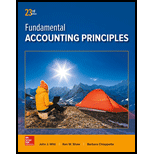
Concept explainers
Concept Introduction:
Cash and Cash Equivalent - Cash and cash equivalents refer to those assets of
Days' Sales Uncollected - Days' sales uncollected are also called average collection period or days' sales in receivables. It is the ratio that measures how long it will take for the customers to pay their credit balances or the average number of days that a business will take to collect its trade receivables.
Requirement 1
To Determine: Total amount of cash and cash equivalent and their percentage in respect to Total Current Assets, Total Current Liabilities, Total Shareholders’ Equity, Total Assets.
Requirement 2
To Determine: The percentage change in cash and cash equivalent.
Requirement 3
To Determine: Days' Sales Uncollected.
Requirement 4
To Determine: Days' Sales Uncollected.
Want to see the full answer?
Check out a sample textbook solution
Chapter 8 Solutions
Fundamental Accounting Principles
- General Accountingarrow_forwardAster Enterprises reports the following at the end and beginning of the year: At the end of the year, the company has Assets of $210,000 and Liabilities of $165,000. At the beginning of the year, the company had Owners' Equity of $60,000. How much did Owners' Equity change by the end of the year? Did Owners' Equity increase or decrease?arrow_forwardIf a company has annual sales of $840,000 with a gross profit margin of 35%, what is the cost of goods sold?arrow_forward
- Please give me answer with accountingarrow_forwardKraft Corporation began the accounting period with $92,000 of merchandise, and the net cost of purchases was $318,000. A physical inventory showed $104,000 of merchandise unsold at the end of the period. The cost of goods sold by Kraft Corporation for the period is ____. provide helparrow_forwardThe combined total department costs for the producing departments after allocating the service department arearrow_forward

 AccountingAccountingISBN:9781337272094Author:WARREN, Carl S., Reeve, James M., Duchac, Jonathan E.Publisher:Cengage Learning,
AccountingAccountingISBN:9781337272094Author:WARREN, Carl S., Reeve, James M., Duchac, Jonathan E.Publisher:Cengage Learning, Accounting Information SystemsAccountingISBN:9781337619202Author:Hall, James A.Publisher:Cengage Learning,
Accounting Information SystemsAccountingISBN:9781337619202Author:Hall, James A.Publisher:Cengage Learning, Horngren's Cost Accounting: A Managerial Emphasis...AccountingISBN:9780134475585Author:Srikant M. Datar, Madhav V. RajanPublisher:PEARSON
Horngren's Cost Accounting: A Managerial Emphasis...AccountingISBN:9780134475585Author:Srikant M. Datar, Madhav V. RajanPublisher:PEARSON Intermediate AccountingAccountingISBN:9781259722660Author:J. David Spiceland, Mark W. Nelson, Wayne M ThomasPublisher:McGraw-Hill Education
Intermediate AccountingAccountingISBN:9781259722660Author:J. David Spiceland, Mark W. Nelson, Wayne M ThomasPublisher:McGraw-Hill Education Financial and Managerial AccountingAccountingISBN:9781259726705Author:John J Wild, Ken W. Shaw, Barbara Chiappetta Fundamental Accounting PrinciplesPublisher:McGraw-Hill Education
Financial and Managerial AccountingAccountingISBN:9781259726705Author:John J Wild, Ken W. Shaw, Barbara Chiappetta Fundamental Accounting PrinciplesPublisher:McGraw-Hill Education





